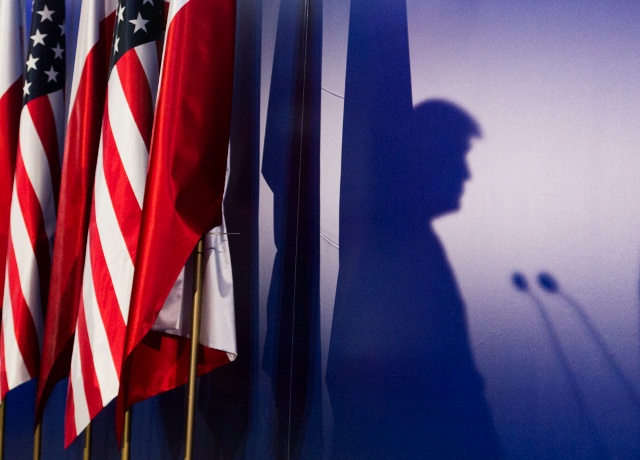
‘Sanity will prevail’: expert says as Trump ramps up NAFTA pressure
by Paul Wiseman, The Associated Press

Canada and Mexico shrugged their shoulders in response to the president's latest threat, while one expert predicted the status quo will win out eventually

Trump’s shadow is looming large over NAFTA talks just a week into negotiations. PHOTO: Shealah Craighead/The White House
WASHINGTON—Just a week into talks to rewrite the North American Free Trade Agreement, President Donald Trump has already threatened to abandon the 23-year-old pact with Canada and Mexico.
At a high-profile campaign-style rally in Phoenix this week, Trump predicted that the United States would “end up probably terminating” NAFTA “at some point,” though he said he hadn’t made a final decision.
While the president’s renewed threat Aug. 22 reignited concerns, Canada and Mexico collectively shrugged their shoulders in response to Trump’s latest comments.
Prime Minister Justin Trudeau’s response Wednesday afternoon, for instance, was to stay the course.
“We’re going to stay focused on what we’ve always known and what we’ve always said, that the North American Free Trade Agreement has resulted in millions of good jobs on both sides of the Canada-US border and is of benefit to both Canadians and Americans,” he said during a news conference in Montreal.
“There are opportunities we have to improve and update the North American Free Trade Agreement and we’re negotiating in good faith and working hard to do just that, but we’re going to stay focused on the hard work we have ahead of us at the negotiating table and that’s how we’ve approached this from the very beginning and I don’t see anything changing in that.”
Related: He can threaten, but can Trump single-handedly tear up NAFTA?
The U.S. president made the same threat in April but then reversed himself after a pushback from American businesses, especially farm groups, which have benefited from expanded access to the Mexican market resulting from NAFTA.
Mexico’s foreign minister also shrugged off the Trump tirade as par for the course, initially tweeting that Mexico would remain at the table, calm and firm in Mexico’s national interest.
On Wednesday he told Mexican television Trump was “negotiating in his own particular style.”
Amid the threat from Trump, U.S. Trade Rep. Robert Lighthizer also warned that the United States wouldn’t settle for a “mere tweaking of a few provisions and an updating of a few chapters.”
Still, experts such as James Jones, who served as President Bill Clinton’s ambassador to Mexico and helped negotiate NAFTA in the mid-1990s, said he expects Lighthizer and his team of negotiators will use Trump’s tough talk to their advantage.
“They’ll try to play it in a way that strengthens their hands,” said Jones, now chairman of the financial advisory firm Monarch Global Strategies. “They’ll tell the other negotiating teams, ‘I’m reasonable, but I report to a boss who’s less reasonable.’ ”
Jones also predicted that eventually “sanity will prevail”—that the U.S. government will recognize that the United States benefits from an economically unified North America.
NAFTA erased most trade barriers separating the U.S., Canada and Mexico. It’s credited with fostering a rapid rise in commerce and closer diplomatic ties among the three countries, but the agreement has long fueled heated criticism in the U.S. because it led some American-based manufacturers to move operations south of the border to capitalize on lower-wage Mexican labour.
Nevertheless, Daniel Ujczo, a trade lawyer with Dickinson Wright, said he doubts that an overhauled NAFTA would do much to narrow America’s trade deficit or restore lost U.S. manufacturing jobs—results that Trump had vowed to deliver to the blue-collar voters in the Midwest who helped elect him.
“There’s not enough red meat to be gained in the NAFTA modernization to satisfy those voters,” Ujczo said. “The president’s going to have to make a choice when he get a pretty vanilla NAFTA modernization—whether or not he’s going to withdraw.”
A U.S. move to abandon the agreement would likely trigger a political furor. American manufacturers have invested heavily in supply chains that straddle NAFTA borders and have come to depend on duty-free shipments within the trade bloc. In Congress, farm-state lawmakers have urged U.S. negotiators to do nothing that would imperil U.S. agricultural exports to Mexico and Canada.
“NAFTA has been incredibly successful for our industry,” said Jennifer Myers, a spokeswoman for the National Corn Growers Association. “We are closely monitoring negotiations and will continue to advocate for corn farmers’ interests throughout this process.”
—with files from Mia Rabson, The Canadian Press